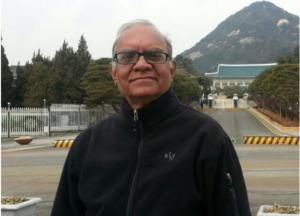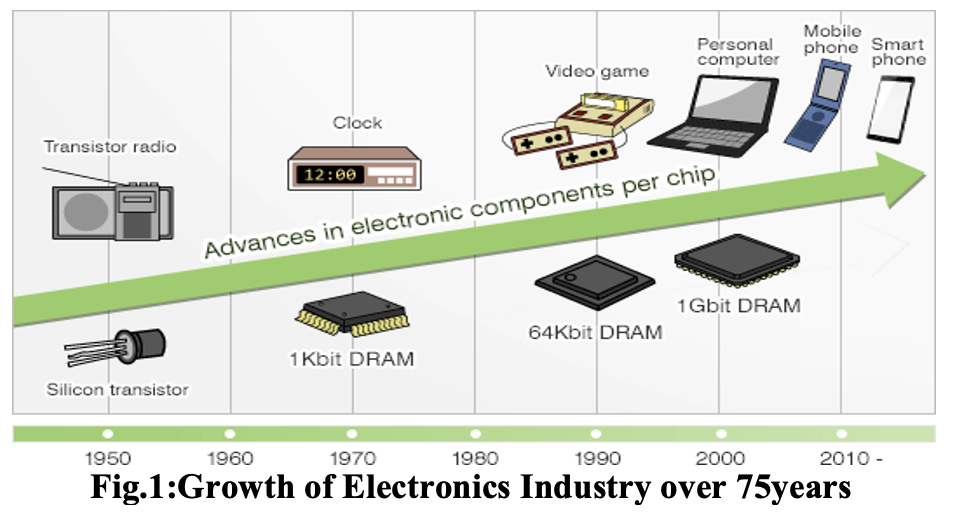Prologue to ‘The Amazing Human Mind’
Study the past, it would define the future.
Confucius, Chinese Philosopher (551–479BCE)
It is a matter of coincidence that around the time India gained independence from British rule, the point contact transistor was invented by Bardeen and Brattain of Bell Laboratories, USA. A year later, in 1948, Shokley invented the junction transistor. In 1959, the bipolar Integrated Circuit (IC) was invented by Kilby of Texas Instruments and Noyce of Fairchild Semiconductor in the US. This had a major impact on the history of semiconductors and it marked the dawn of the ICera.
In 1965, three years before co-founding Intel Corporation,Gordon Moore (1929–2023) made a forecast. Based on his observation of what had been happening with ICs at that time, Moore predicted that the capacity and complexity of transistors that can be packed in ICs would double every year. Moore’s observation—which subsequently became famous as Moore’s Law, albeit once in eighteen months instead of one year—has been a guiding force in the semiconductor industry for planning research and development goals.The IC was small in size and light in weight and this helped the electronics industry grow by leaps and bounds over the following six decades (Figure1).
Ref: https://www.hitachihightech.com
It was perhaps for this reason I ended up becoming an electronics engineer! In June 1968, I visited my father’s uncle—a retired professor of Mathematics—to share the results of my pre-university exams. He advised me to take up the newly-announced Electronics branch of engineering at University College of Engineering (UCE) (now UVCE, having been renamed after Sir M Visvesvaraya). Without any idea of what the engineering course entailed, in deference to my uncle’s suggestion, I joined UCE—after quitting the Physics B.Sc.(Hons.) course that I had enrolled for, just a few days earlier.
There are two basic forms of decision-making: belief-based decision-making and values-based decision-making. We either make decisions that align with our beliefs, or we make decisions that align with our values. During the early part of our lives we tend to make decisions based on our beliefs. I believed that by joining B.Sc (Hons), in three years I’d be employable. But my father’s uncle, an experienced professor saw better value for employment though B.E is a five year program. As we grow older, we shift to using our values to make decisions. This decision changed the course of my life.
We live in a socially scripted world; earlier it was village-centric and now it has become global-centric because of technology. The process of achieving progress, however, appears to be more or less the same –getting educated, becoming economically independent, finding a partner, establishing afamily, buying a car, building a house, educating the children, and retiring. Though I set out on this path until my mid-thirties, I decided to change my life path.
Just like my teen-aged friends in my neighbourhood, I spent much of my high-school years playing all sorts of games—indoor and outdoor—in addition to watching movies. Fortunately I got through year after year with a first class (>60% average). In fact, I cleared the State Secondary Schools Board Examination with 80% and was awarded a merit-cum-means scholarship from the Government of India. This enabled me to pursue higher studies given that my father did not have the means at that time. That said, we were living in a fairly big ancestral home.
Even as I entered high school, I was lucky to have an independent room in our ancestral house, situated on a busy artery road in Halasuru (earlier known as Ulsoor)—less than a kilometre from MG Road. My great grandfather had purchased this house in 1877 as he was employed with Bangalore City Corporation housed in Mayo Hall, little more than a mile away.
My grandfather was the elder of the two sons of my great grandfather. He retired in 1935 as Office Superintendent of Mysore Government Insurance Department (later known as KGID, when the name of State changed from Mysore to Karnataka). With his retirement benefits, he demolished the old house constructed with mud and bamboo and built a house with five rooms, a hall, a dining room, kitchen, and two verandas (sit-outs)—spread over nearly 1,800 sq. ft. with Madras terrace and tiles.
After I moved into the independent room, I came across a small book in which my grandfather had maintained the accounts of Rs.200 that he had spent to make the main entrance door of the house built in 1935–36. This was perhaps the trigger that made me think about the past. I tried to visualise my grandfather’s efforts to rebuild our ancestral home in the 1930s.
As a student of engineering, with barely a few weeks of preparation before the exams, I could obtain fairly good marks, and moved on from semester to semester. Not only did I complete my engineering degree specialising in Electronics and Communication but also obtained employment in a premier Public Sector Undertaking (PSU) after clearing the competitive examination, group task, and personal interview. This made me think deeply about learning and the mind.
I worked as an R&D engineer for nearly ten years before deciding to quit my PSU job and become an entrepreneur—without really understanding the risks involved in business. For seventeen years, I managed businesses with a few partners and realised that my approach to life and money were totally different from theirs. During this period I lost my father and took charge of the family affairs. It became important for me to think about and plan my future carefully so that my family should not get hurt. By the time I entered my fortieth year, introspection and reflection had become part of my work.
Whatever we need or whatever is important to us—is what we value. Conversely, if we don’t need something or if something is not important to us—we don’t value it. What most people care about, without necessarily realizing it, are their feelings. We want to be happy and we want to experience joy. As we grow and develop, our needs change, and consequently our values and our value priorities change. Despite the changing nature of our values and value priorities, there are three things that we value at all ages—survival, safety and security.
As I turned fifty one, I exited all the enterprises that I was part of and registered for a PhD program. I used my spare time for developing and implementing community projects, mainly in the area of eye-care, through Rotary International apart from advising small- and medium-scale electronics industries and higher educational institutions. I have pursued a variety of jobs over the years – research and development, entrepreneurship, academic research, social work, mentoring, etc. However, I have come across a greater variety of people—and this sparked my curiosity to understand human nature, which I believe to be determined by the mind.
The mind has always fascinated and puzzled me. It is one of those things that we can be certain of existing, yet don’t know exactly what it is, how or why it occurs. That said, I learnt the following: If I could take charge of my own mind, I could take charge of my life as well as help my family. Overtime, I understood that I must be an eternal student and be conscious about the situation that I am in.
In the forthcoming sections, I plan to share this process of understanding human mind as well as the process of learning and attaining a sense of peace and happiness internally, while fulfilling responsibilities of family, profession, and society.
That said, I hope you enjoy reading it as much I enjoyed writing my understanding of the mind and managing it over all these years!
~~~
June 1st, 2023 | Ravi 59

